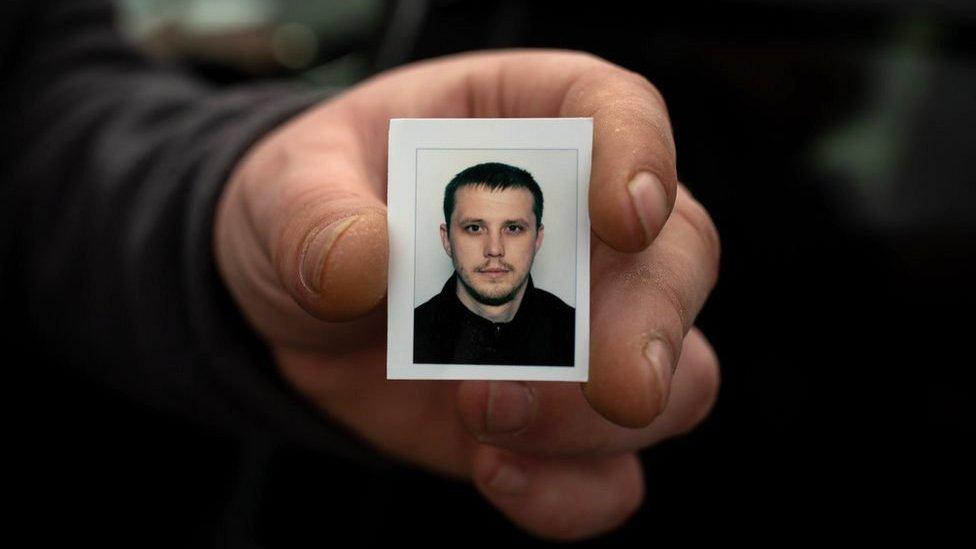The five-year-old Ukrainian learning to love Scotland
- Published
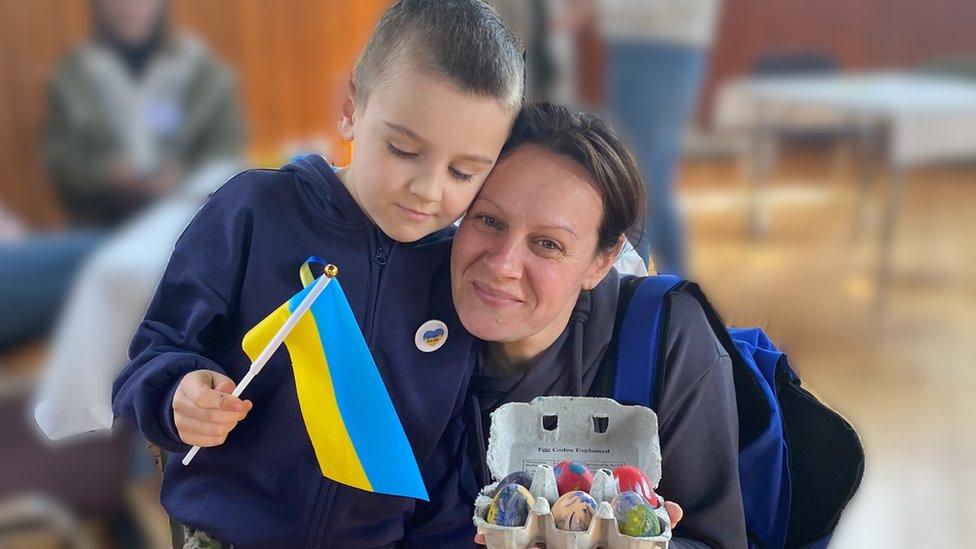
Five-year-old Oleksii and his mother Nataliia have come to Scotland under the Homes for Ukraine scheme
Five-year-old Oleksii, who now shares our Scottish house as part of the Homes for Ukraine scheme, refuses to speak Russian.
His act of defiance began in Ukraine after he asked his mother: "Why do so many people speak Russian if the Russians came to kill us?"
Before he arrived in Scotland a few weeks ago, Oleksii lived on the edge of Kyiv near the road that leads to Bucha. This was near where the column of Russian tanks lined up for an assault on the Ukrainian capital earlier in the war.
His family could hear one explosion after the next and "saw the sky turn purple" so they fled to the west of the country in search of safety.
I first met his mum Nataliia over a video call. I had been in touch with a contact I had filmed with for a Panorama programme in Ukraine many years earlier to ask if I could help.
Her answer was Nataliia. On the video call, and with a family member translating, she seemed warm but pragmatic. I liked her. Soon after, we started the form-filling and the planning to bring her and Oleksii to Scotland.
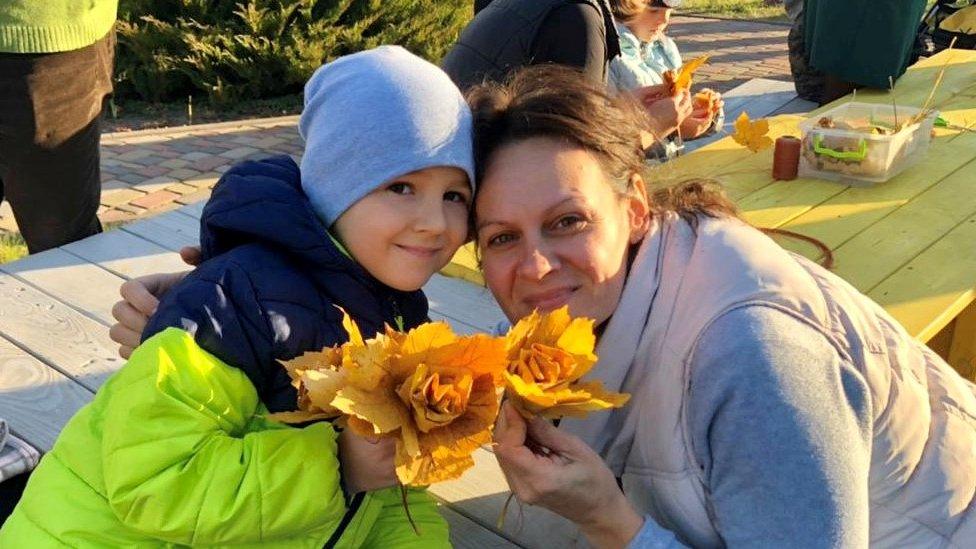
Oleksii and Nataliia before the war near their home outside Kyiv
When the Russian soldiers withdrew from Kyiv, Nataliia and Oleksii moved back but they were not sure how long the calm would last. Her husband knew he had to stay behind regardless.
In time, Nataliia forwarded the visa approval letter from the UK home secretary and they were finally able to get on their way.
She booked flights from Poland but first, she had to get out of Ukraine.
She sent me videos she had taken on her phone of their route. They were images I've seen on the news but ones a five-year-old should not have to see in real life.
They travelled past the burnt-out tanks on the main road near their home, past people with guns and past the bombed maternity hospital.
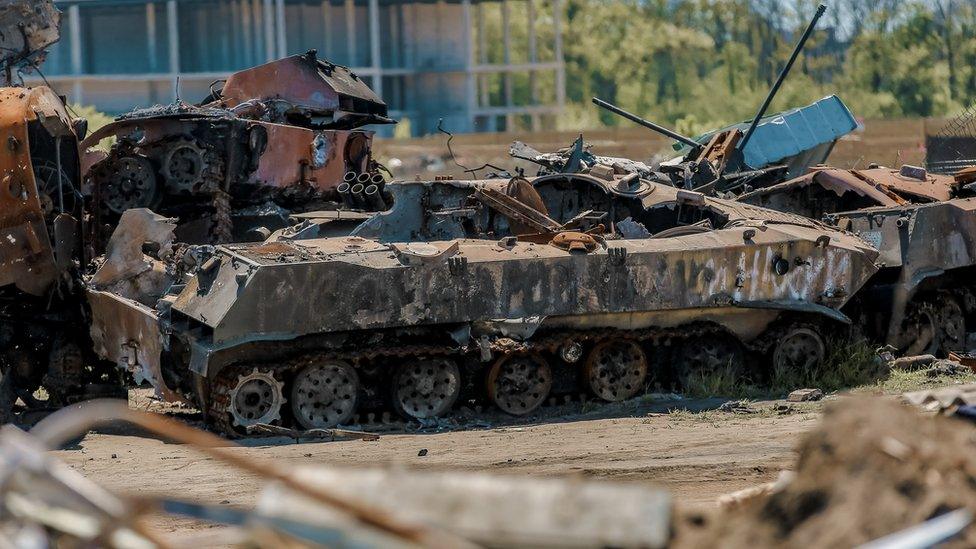
Destroyed Russian military vehicles lie in a garbage dump in Bucha
In contrast, we were sorting out the spare room, learning some basic Ukrainian and buying in Chicken Kyivs.
My kids took it all on with the gusto of a school project, perhaps not stopping to calculate how it would change their lives.
When the big day arrived I went to Glasgow airport and met a woman in Scotland I had contacted after Nataliia discovered she was a distant relative.
Nataliia had been thinking back to how her grandmother told her that her two brothers became refugees in Scotland after World War Two.
She started trying to trace their relatives and got a phone number for her long-lost cousin Jeanne.
More than 70 years on from giving refuge to Nataliia's ancestors, Scotland was again providing refuge for a family separated by war.
As we stood waiting at the airport, cast together by a woman none of us had ever met, I would have liked to get to know Jeanne better but we both had an eye on the arrivals area.
Any mother and child that steps through from baggage collection made us pause, "Is that them?", then breathe out and pick up the conversation again mid-sentence.
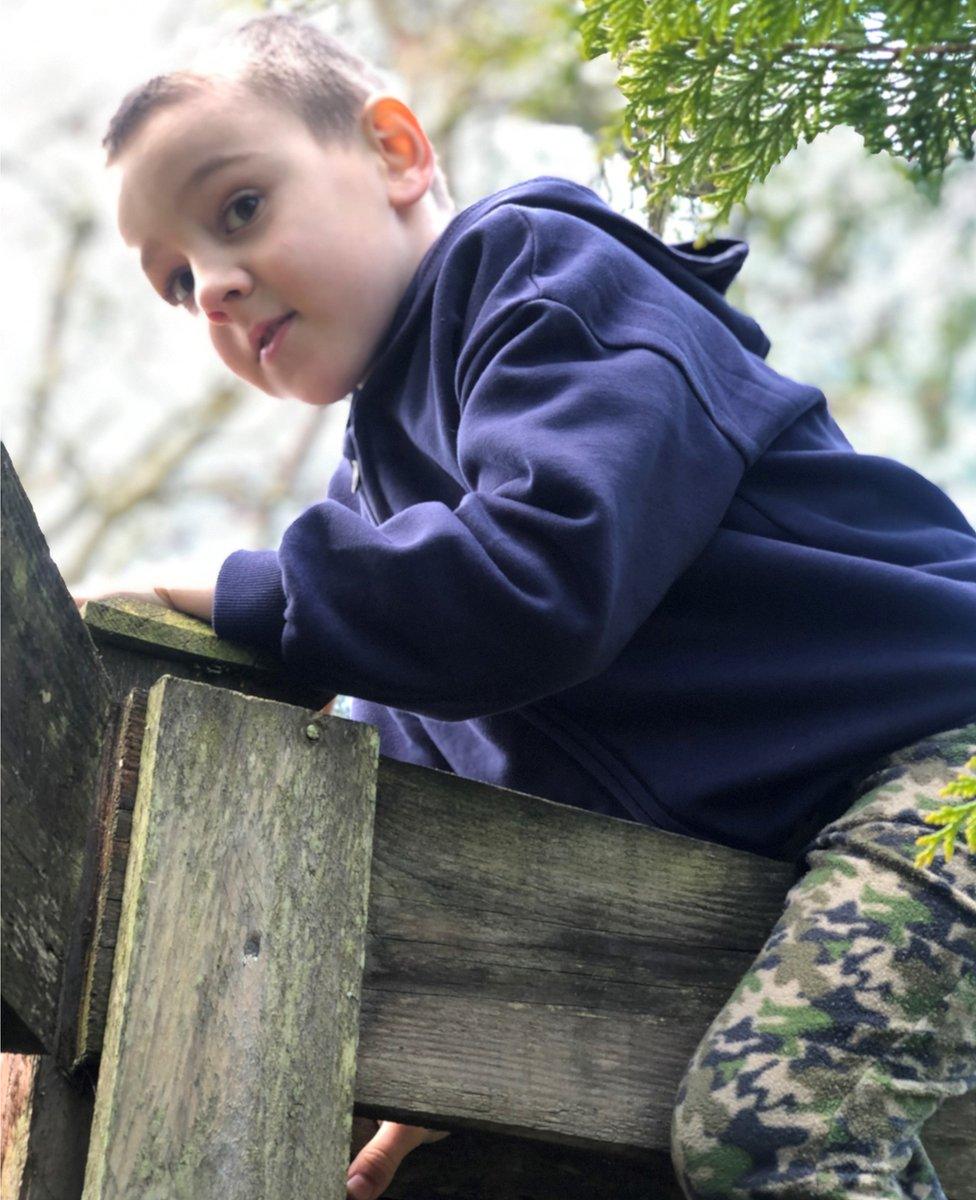
Oleksii loves to play in the woods

My phone rang. It's border patrol. They were checking we were genuine sponsors. It was quite a relief as I hadn't heard a peep from officialdom since I filled out the visa forms.
"Special Branch will want 10 minutes with them," they said.
When they finally appeared around the corner, I realise how emotionally invested I was in them already. So was Jeanne and her family.
While my kids had been painting welcome signs for them and putting out Lego for Oleksii, I had been doing the thinking, the worrying, the getting to know them and considering the impact on my own family. And so with that first hug at the airport, I cried through my smile.
Nataliia had paid for one piece of luggage on the plane for the two of them. Just one bag to take them into the unknown, for who knows how long. I take more than that on a one-week holiday. I guess stuff has less value in wartime.
Within 10 minutes of arriving, she opened the bag to offer presents: Ukrainian sweets, chocolates, mugs, honey. I kept thinking she could have brought another pair of shoes, maybe her favourite woolly hat and a photo album, if she hadn't been so thoughtful.
In the car, we were eager to show off our country. She was on a translation app to work out what we were saying when she couldn't interpret our acting.
'It's perfect'
When we showed them up to their room, she said in English: "It's perfect". It's not of course but it's light and airy and it's safe.
Her brain must be exhaustively retrieving long-ago-learned vocabulary from a school textbook.
My attempt to learn Ukrainian is in all honesty more of a gesture and an attempt at solidarity. Her attempts to improve her English are a necessity.
But the first question to really fox me was: "What horse stand up?"
We go back to the translation app which tells us she means: "What time do you get up in the morning?" And so the laughter begins.
We went for a walk in the woods and Oleksii's face tells us everything.
His body unfurls, his downcast eyes are now playful and he breathes in the freedom to explore.
Nataliia explains that although the soldiers have left Kyiv, the children can't play in their parks or woods or school grounds because it is dangerous. There is unexploded ordnance all around them at home.
By the afternoon, it's clear Nataliia wants to make herself useful. I find her cleaning our walls. And as we job-share in the kitchen we chat easily.
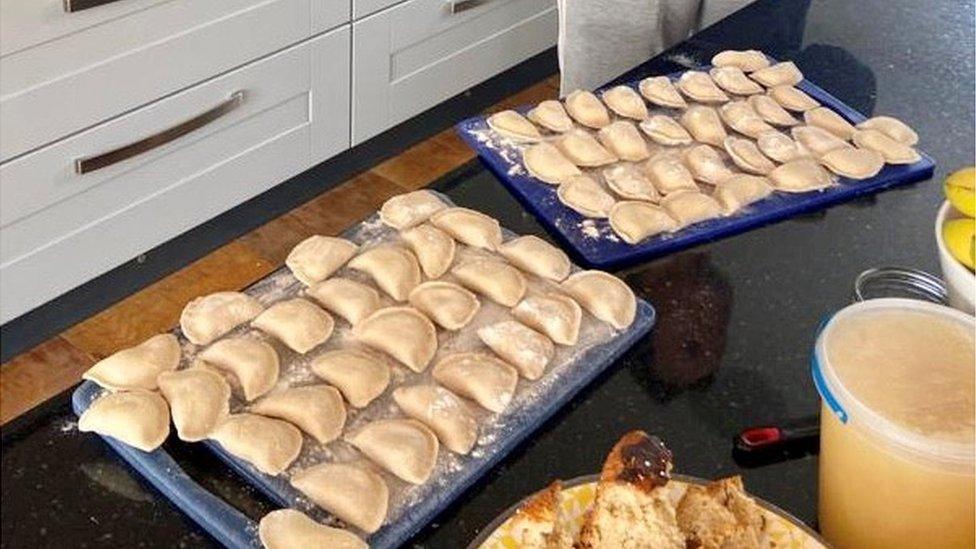
Nataliia cooked potato dumplings called varenyky
Being forced to use simple language distils her experiences down to the bare truths, adding to their starkness.
She talks of running to shelters at night, how associating bombs and air-raid sirens with night-time has made Oleksii afraid of the dark. How scary it was travelling under war-time conditions.
I realise just how close they were to the fighting when she says: "We were leaving to escape the first time on the very day the Russian troops were advancing.
"The sky was black. Tanks and artillery were on the edge of our village - that's where the Ukrainian troops stopped the aggression."
As we get to know each other I start to experience the war through her eyes. Not just seeing it on her social media, but feeling it.
"My husband has heard explosions today," she tells me as we put the knives and forks on the table.
"This bomb hit a tank manufacturer just 100 metres from my sister's home," she says as we chat by the sink.
Her English vocabulary is expanding to include the glossary of war.
Nataliia says: "Before I didn't know what war was, when it was in Syria or Yemen it was somewhere else. Now I know war".
We go to have their identity verified for their visa with biometric data checks and it feels like this is the final stamp of becoming a refugee. Not a label she wears easily - certainly not one she had ever planned for in life.
First day at school
In Ukraine children don't start school until they are six so Oleksii's first ever day in class is in a foreign country where he can't understand his teacher or his classmates.
He can count to 10 in English, knows some animals and the words to "Rain, rain, go away, come back again another day".
"Oleskii is nervous," Nataliia says. "He is scared."
We teach him how to ask to go to the toilet and how to pronounce his teacher's name before we arrive at the school gate.
It seems fear of separation has become entrenched since the war started, for Nataliia too.
"I am scared because I won't be near him," she tells me.
At lunchtime we go to get Oleksii and Nataliia finds out he has been crying.
He wanted to ask if his mother would ever return to get him? It's an important question but he didn't have the words to say it.
I ask him if school has been good: "Dobre?"
"Ni," he says. No.
All this with his father inhabiting his son's life through video calls, from inside a country at war. He can't be there for his son's first day at school.
After day four, I ask about school again and I get a reply of "dobre" and a gentle smile. I don't hold back my smile. Nataliia's is unmissable.
I hear about a wee boy who goes up to Oleksii in the playground and says: "Hello, we have the same shoes". Oleksii doesn't understand. But maybe he does understand that it's an offer of friendship.
Dumplings and borscht
Jeanne is also enjoying getting to know her newfound family.
"Nataliia is very like what my grandmother looked like," she says.
"I always felt a great loss not knowing my Ukrainian side of the family so I feel I've been given a wee bit of that back.
"In my heart, family comes first so we are so thankful that Natalia is here with Oleksii and we can be here for her."
And so, back at home, we settle in to a pattern of eating dinner together in the evenings and then maybe going out to play with Oleksii for a bit.
We are thankful for the international joy of hide and seek.
We meet other Ukrainians, we do the admin of refugee life and Nataliia cooks us dumplings and borscht.
"I love Tesco," she says.
For us, and for Nataliia and Oleksii, this is how life begins as a refugee.
Related topics
- Published13 April 2022
